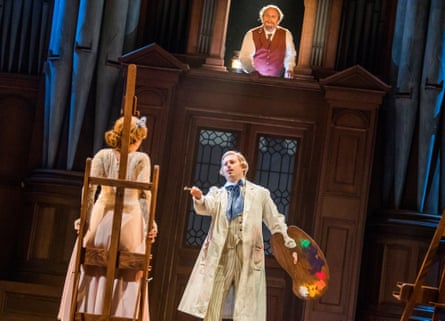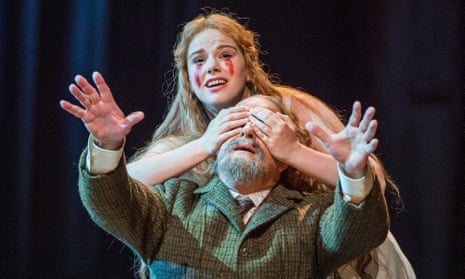Anyone visiting Glyndebourne for its new production of Pelléas et Mélisande would be advised to take a quick tour around the organ room there before curtain-up, to remind themselves of its layout and the paintings on the walls. For Stefan Herheim’s staging, handsomely designed by Philipp Fürhofer, faithfully re-creates that space, which once housed the largest British organ not in a cathedral, and which is still dominated by the case and surviving pipes of that huge instrument.
Herheim’s production is set in the period between the world wars when John Christie took over Glyndebourne, had the organ built, and started hosting opera performances there. But that self-referential mise-en-scène proves to just one of the multiple layers of allusion presented here, only striking a false note at the woefully banal final curtain. By then, though, the plethora of symbolism loaded on to what is already the archetypal symbolist opera has become a real distraction from the central tragedy of this emotionally bereft and isolated royal family.
There’s just too much to wonder and worry about – why, for instance, are there references to pre-Raphaelite imagery – in the long, red hair of Golaud’s fantasy Mélisande, or the image of Christ carrying a lamb on his shoulders in the third act; why in act 4 does the shepherd become a priest, sanctifying or perhaps giving communion to the household staff; and what does a line of empty easels across the stage signify in the third act?

Some of Herheim’s other glosses seem more appropriate and do make a deeply disturbing opera even more disturbing – Golaud’s abuse of his son Yniold is sexual as well as psychological here, and Golaud blinds Pelléas and later Mélisande too, as if mimicking Arkel’s near-blindness, in a world in which truth and reality are always hard to glimpse. But alongside that heightened theatre of cruelty, conductor Robin Ticciati’s warm and beautifully played reading of the score, looking back to Gounod more than forward to Stravinsky and Bartók, seems out of place, and even the most shocking moments are presented in such a chilly and detached way, it’s hard to muster sympathy for any of the protagonists.
Even Christina Gansch’s Mélisande, beautifully sung, and catching the balance between ethereal mystery and passionate involvement perfectly, is kept at arm’s length, while the baritone Pelléas, John Chest, seems to move a little too easily from the shy gaucheness of his first appearance to his willing complicity with Mélisande. But Christopher Purves’s Golaud is the main casualty of the approach. In most productions of Pelléas it’s possible to feel pity for Golaud without condoning his actions, but there’s little chance of that here, as he seems to move farther out of focus as the opera goes on and his insane jealousy increases. By the end he has become just a husk, barely responsible for his actions but also hard to place in the final tragedy, which almost seems to be orchestrated by Brindley Sherratt’s Arkel, though on the first night Sherratt had a throat infection and walked through the role, while it was sung rather formidably from beside the stage by Richard Wiegold. Karen Cargill’s wonderfully rich-toned Geneviève has little to do, alas, while Yniold is sung by a soprano, Chloé Briot; given that he becomes a surrogate for Mélisande in Herheim’s reading, that’s no bad thing.
- In rep at Glyndebourne until 9 August. Box office: 01273 815000.

Comments (…)
Sign in or create your Guardian account to join the discussion